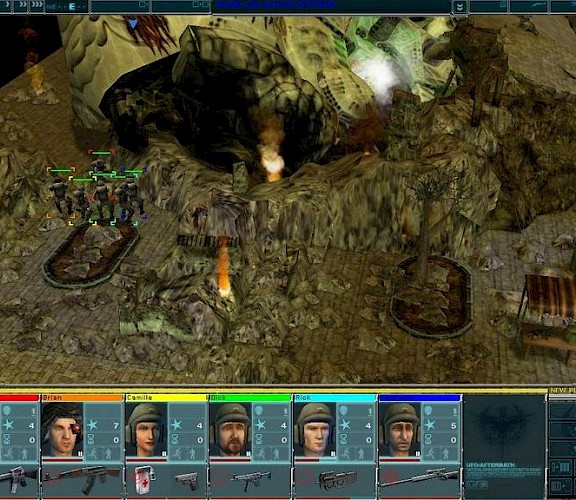Aftermath Comes War
Format: PC.
Developer: ALTAR Interactive.
Publisher: Cenega.
Release date: 3rd Oct. 2003.
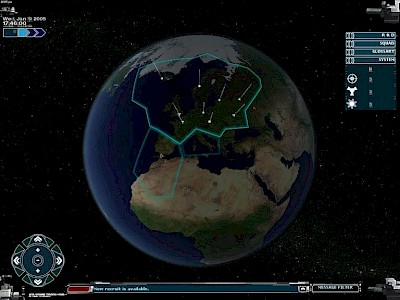
I don't think so. That would be paranoia. But that doesn't mean it isn't happening...
Anyway, as we all know, the aliens have invaded. This time, they bombard the planet with spores before moving in, killing or mutating the majority of life on earth. Obviously the aliens have gone a little soft, and no longer feel up to leading the invasion. The ragged remnants of humanity coalesce, forming the Council of Earth (Eat it, United Nations) and their multinational unit of meat he- er, cannon fo- um, elite soldiers, Phoenix Company. Your mission is to strike back, and stop them from wiping out the human race.
UFO: Aftermath has two main game modes. The first is strategic, giving you a global view of the Earth. Here, you intercept alien craft and choose ground missions, assigning them to your own hard nuts or delegating them to decidedly less elite forces. By carrying out missions, you spread your influence and gain new territories and the bases within. At the beginning, the three types of bases are military, research, or engineering. The first extends your influence further over the local area, the latter two contribute to research and development respectively. The aliens can of course steal this territory back from you, often culminating in the traditional base assault.
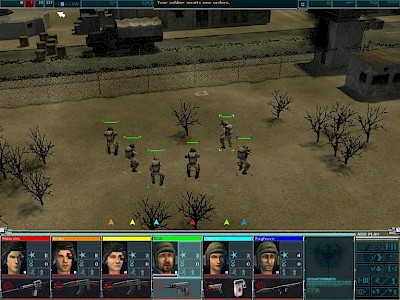
The second game mode is tactical, with your men carrying out missions to capture downed alien craft, rescue inept pilots who were shot down, recover live enemy specimens and capture and defend bases, to name a few. The simultaneous action system is basically real-time but you can pause it whenever you want. The action also pauses whenever something significant happens. The default conditions are annoying. "Sir, I stubbed my toe.", "Sir, I saw a small marmoset.", "Sir, I have to go to the toilet." and other trivial things, but this can be easily changed. Movement orders queue nicely, but others do not, for some reason. A soldier will move to Point A and then on to Point B, but will not move to Point A and start firing at an enemy. This makes combat slightly more laborious than it should be, and I hate the SA system anyway. It makes the pacing of the missions uneven, with an arrhythmic stop-start-stop progression that makes it difficult to play for long periods of time.
There are quite a lot of missions in the course of the game, and you're meant to take on the most important ones yourself and delegate or ignore the others, because you only have one squad, and one helicopter to transport them in. I know, you'd think the Council of Earth would have given the force that is fighting to save humanity a few more resources, but no. Apparently not. You have a maximum of seven soldiers with which to tackle any mission. I don't have a problem with that, a smaller squad means the gameplay lurches along faster, but only having one squad seems a mite harsh at best, and artificially stringent at worst. Obviously the aim is to enhance the strategic element, and prevent you from carrying out every mission and beating every enemy like a ginger stepchild, I just feel you could be nudged in that direction with a little more subtlety.
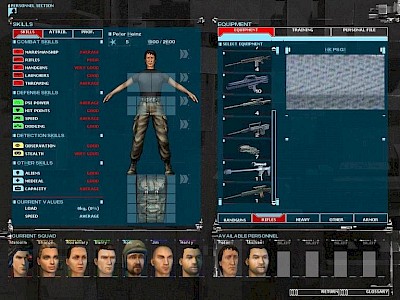
I do enjoy a good challenge, and Aftermath provides one. Your team, no matter how elite they get, never get so good that you can disregard tactics. The 'Hard' difficulty especially gives you a good game, with a steep but regular learning curve, except in the very last stages where it goes a bit mental. Admittedly, the difficulty is directly linked to your performance, and can take some frustrating jumps, but that's a lot better than being able to walk all over the opposition. This is a fight against overwhelming odds, after all.
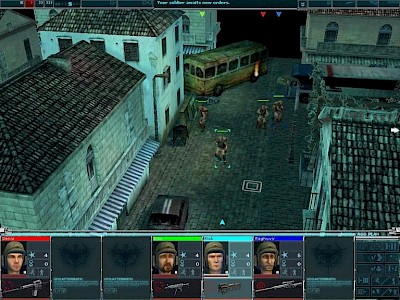
Honourable mention goes to the man who thought the arrow keys should make the camera rotate in the opposite direction. Now I know why people go on killing sprees.
The music is quite unobtrusive, and does what it's meant to. Even the tunes on the strategic view are inoffensive enough to remain turned on throughout the game, and usually thematic background tracks are the first things that A) annoy me and B) get switched off. The interception music is quite rousing, despite its annoying loop (bet they wanted 'Danger Zone' from Top Gun, though) and even the tactical mission tunage is okay. Sound effects are nice, nothing special, and the speech is bloody annoying. If I never hear Dick 'Speech Therapy' McReady slur "No route t'destinashun." again, like a drunk with a cleft palate, it will be too soon. Their constant talking combined with the little green health bars, only reminded me of Command and Conquer, no one's idea of tactical depth, I'm sure. Still, akin to my dislike of the SA system, this is not so much a fault with the game as my personal preference.
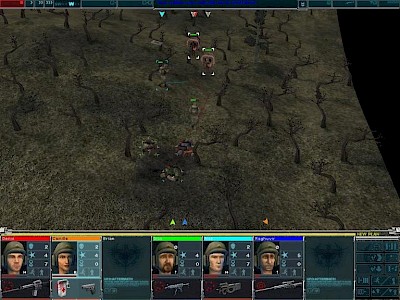
There's a lot I don't like about UFO: Aftermath. It has some glaring flaws, it's far from perfect, but I still enjoy playing on it, and it's a good starting point for Altar to build upon.

